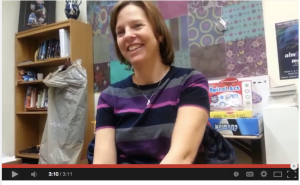If you’ve been following our blog, you saw this coming: we love libraries. Remembering our libraries from early school days, no one spoke above a whisper, the Dewey Decimal System ruled from little oak boxes and worlds and ideas were shelved neatly for all to access, quietly. Admittedly, libraries have changed radically since “the good old days,” and today students speak in an audible tone.
Mr. Dewey and his system are replaced with a bright PC, and rows of computers are busy with students who are accessing technology and integrating that into their homework. At the tables, students are trading specialty cards, practicing debates, tutoring one another, and doing all of the activities that make school interesting to students. But worlds and ideas are still available on the shelves for students to enjoy.
This buzz of activity that has replaced earlier library memories demonstrates how practical and mainstream libraries have become in our schools as they promote and help students develop literacy skills; they are a hub of activity and learning. The library becomes essential to the learning culture of the school, but as school budgets shrink, districts are forced to make hard decisions and the librarians and library aides disappear from our school landscape. But at what price are we saving dollars for our districts?
Contrast the role of the librarian of our memory to the unique role the librarian plays today. This specialized program requires such a wide variety of expertise. A sample job description of a school librarian from the American Librarians Association partial list includes:
- Accessing participating in the curriculum development process at both the building and district level to ensure that the curricula include the full range of literacy skills (information, media, visual, digital, and technological literacy) necessary to meet content standards and to develop lifelong learners
• Collaborating with teachers and students to design and teach engaging inquiry and learning experiences and assessments that incorporate multiple literacies and foster critical thinking
• Participating in the implementation of collaboratively planned learning experiences by providing group and individual instruction, assessing student progress, and evaluating activities
• Joining with teachers and others to plan and implement meaningful experiences that will promote a love of reading and lifelong learning
• Providing and planning professional development opportunities within the school and district for and with all staff, including other school librarian
Never before have teachers needed the librarian and their expertise. Facing Common Core and the new rigor in non-fiction, teachers across the nation are looking for help to access the new material, and librarians have that expertise and are essential to the creation the new assessment. Librarians can be the greatest asset for teachers. Why you need your School Librarian demonstrates that teachers do not have to go into the Common Core alone, rather, their greatest advocate can be their librarians as they direct them to reading and supplemental materials to enhance their lessons.
But the cuts continue, and the impact is felt in the classroom today and in the colleges tomorrow. Consider San Francisco libraries hit hard by budgets and the realize that monies saved will rob students of the literacy opportunities that will prepare them for college. It is about more than just money; it is about our future; it is about literacy. Librarians create an environment of literacy and enrichment that changes the academic atmosphere of a school. Do we dare continue to cut that element of our school while we demand more change and rigor in the classroom? Do we understand the decisions made today are not about the budget but rather the future?
Oregon School Librarian of the Year, Elizabeth Beazizo, jokes that her award comes because there are so few of her profession left, it was just her turn. Nothing could be further from the truth as she continues to work with district leaders, classroom teachers, and her specialty, students. Her library is a respected center of West High School where student gather to not only learn but to be together. Decorated with student art, it is an oasis for many, including teachers. Here is a brief interview with a woman who is admired by many as she rocks her profession:
Click here to view: How Oregon Librarian of the Year Plays a Vital Role in Student Achievement:
Libraries and librarians shape the culture of our school as they allow students to allow unlock ideas and worlds beyond their current reality. When will we learn that enough is enough and stand with our librarians? It must be a stand we are willing to take because it is about all our futures.
Pattie Sloan and Joan Flora: two teachers challenging classroom status quo.


Hello There. I found your blog using msn. This is a really well written article. I’ll make sure to bookmark it and come back to read more of your useful info. Thanks for the post. I will certainly return.
Pingback: job titles – what’s in a name?
Pingback: job titles – what’s in a name?
Thank you for reading and supporting our work. Frankly, we couldn’t do what we do as teachers without our amazing colleagues, school librarians.
Thank you for pointing out how a school librarian can really make a difference to a school if given the opportunity to do their jobs properly. Unless schools recognise this and senior management teams begin to take school librarians seriously it is a very difficult job to do. Keep writing like this, it is really important.
Pingback: The Real Cost of Cutting School Libraries | DPS Teacher-Librarian Advocacy Source